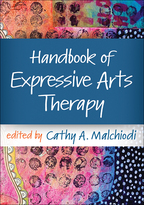Handbook of Expressive Arts Therapy
Edited by Cathy A. Malchiodi
HardcoverPaperbacke-bookprint + e-book
Hardcover
orderOctober 26, 2022
ISBN 9781462550531
Price: $71.00 334 Pages
Size: 7" x 10"
Paperback
orderNovember 29, 2022
ISBN 9781462550524
Price: $47.00 334 Pages
Size: 7" x 10"
e-book
orderOctober 11, 2022
PDF and Accessible ePub ?
Price: $47.00 334 Pages
ePub is Global Certified Accessible
print + e-book $94.00 $56.40
orderPaperback + e-Book (PDF and Accessible ePub) ?
Price: 334 Pages
ePub is Global Certified Accessible
Sign up for emails on upcoming titles on Trauma & PTSD (with special discounts)!
“Both practicing therapists and students in the mental health field will benefit from the completeness of this handbook….Each chapter of the handbook can be read on its own, but taken together, they form an almost encyclopedic collection of what is available for therapeutic use today. *****!”

—Doody's Review Service
“Malchiodi and colleagues elegantly describe how expressive arts therapy can facilitate healing of brain, mind, and body, by fostering social connection, emotion regulation, rhythm, and play. These approaches have been used for centuries and have the ability to aid in healing traumatized individuals and communities. A 'must read'!”

—Ruth A. Lanius, MD, PhD, Department of Psychiatry, University of Western Ontario, Canada
“A comprehensive guide to understanding the breadth and depth of expressive arts as a mental health intervention. Malchiodi has brought together a team of experts who lead the reader through the rationale for expressive arts therapy from multiple theoretical frameworks and applied to multiple populations. Contributors give particular attention to current issues related to interpersonal neurobiology, social justice, and trauma. The clinical illustrations bring the interventions to life and help readers fully appreciate the difference that expressive arts therapy can make for clients. I would use this book as the primary text for our graduate expressive arts course, or as a recommended text for my advanced play therapy course. I especially appreciate the chapters that address history and theory, which will help graduate students develop a stronger theoretical grounding for their work.”

—Dee C. Ray, PhD, LPC-S, NCC, RPT-S, Regents Professor in Counseling and Higher Education, and Director, Center for Play Therapy, University of North Texas
“This powerfully informative handbook provides more than core expressive arts principles and methodologies—we also see how expressive approaches are integrated into a range of therapies. Chapters by premier practitioners consistently emphasize how the expressive arts are strengths based, action oriented, and attentive to the mind and body. The book is filled with real-world implementation strategies, best-practice principles, case examples, and important consideration of individual, group, and family contexts. It is tremendously helpful in moving the reader beyond abstract theory to step-by-step methods of facilitation with clients.”

—Raphael Travis Jr., LCSW, DrPH, Professor and MSW Program Director, Texas State University School of Social Work
“This book offers an essential introduction to principles of expressive arts therapy and brings together stellar contributors who are recognized authorities in their areas of expertise. Each chapter provides relevant illustrative examples of how the arts may be used to find relief, meaning, agency, and vitality. This handbook is an indispensable resource for all helping professionals interested in how to integrate various forms of expression within psychotherapy.”

—Nisha Sajnani, PhD, RDT-BCT, Director of Drama Therapy, New York University
—Doody's Review Service
“Malchiodi and colleagues elegantly describe how expressive arts therapy can facilitate healing of brain, mind, and body, by fostering social connection, emotion regulation, rhythm, and play. These approaches have been used for centuries and have the ability to aid in healing traumatized individuals and communities. A 'must read'!”
—Ruth A. Lanius, MD, PhD, Department of Psychiatry, University of Western Ontario, Canada
“A comprehensive guide to understanding the breadth and depth of expressive arts as a mental health intervention. Malchiodi has brought together a team of experts who lead the reader through the rationale for expressive arts therapy from multiple theoretical frameworks and applied to multiple populations. Contributors give particular attention to current issues related to interpersonal neurobiology, social justice, and trauma. The clinical illustrations bring the interventions to life and help readers fully appreciate the difference that expressive arts therapy can make for clients. I would use this book as the primary text for our graduate expressive arts course, or as a recommended text for my advanced play therapy course. I especially appreciate the chapters that address history and theory, which will help graduate students develop a stronger theoretical grounding for their work.”
—Dee C. Ray, PhD, LPC-S, NCC, RPT-S, Regents Professor in Counseling and Higher Education, and Director, Center for Play Therapy, University of North Texas
“This powerfully informative handbook provides more than core expressive arts principles and methodologies—we also see how expressive approaches are integrated into a range of therapies. Chapters by premier practitioners consistently emphasize how the expressive arts are strengths based, action oriented, and attentive to the mind and body. The book is filled with real-world implementation strategies, best-practice principles, case examples, and important consideration of individual, group, and family contexts. It is tremendously helpful in moving the reader beyond abstract theory to step-by-step methods of facilitation with clients.”
—Raphael Travis Jr., LCSW, DrPH, Professor and MSW Program Director, Texas State University School of Social Work
“This book offers an essential introduction to principles of expressive arts therapy and brings together stellar contributors who are recognized authorities in their areas of expertise. Each chapter provides relevant illustrative examples of how the arts may be used to find relief, meaning, agency, and vitality. This handbook is an indispensable resource for all helping professionals interested in how to integrate various forms of expression within psychotherapy.”
—Nisha Sajnani, PhD, RDT-BCT, Director of Drama Therapy, New York University



